40th anniversary book
ASU Morrison Institute for Public Policy commissioned JDD Specialties LLC to write its 40-year history. The storytelling approach makes for fun, enlightening reading about the institute’s origins and survival.
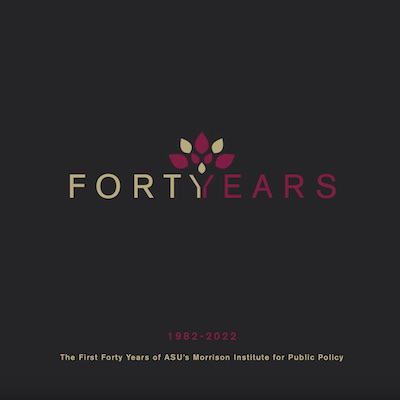
ASU Morrison Institute for Public Policy commissioned JDD Specialties LLC to write its 40-year history. The storytelling approach makes for fun, enlightening reading about the institute’s origins and survival.

A feature article on Carolina Aranibar-Fernández explains how LISC Phoenix takes creative placemaking to next level with a new artist-in-residence position.
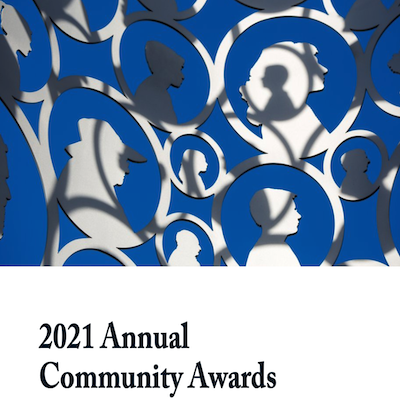
JDD Specialties continued an annual tradition of writing profiles of people and organizations that LISC Phoenix identifies as doing exemplary work in helping to build equitable communities. The 2021 honorees include:
UMOM’s Newsom Village, exemplary project: Newsom Village builds upon UMOM legacy of developing permanent affordable housing
Arouet Foundation’s Financial Opportunity Center, exemplary program development: Arouet Foundation rises to challenge of operating a LISC Financial Opportunity Center
Mesa Vice Mayor Jenn Duff, exemplary advocate: Jenn Duff’s continuous search for best ways for Mesa to develop starts with neighbors and local businesses
City Councilmember Robin Arredondo-Savage, exemplary advocate: Robin Arredondo-Savage brings small business, veteran background to Tempe community-development efforts
2020 Funds to Feed grantees and partners, exemplary community response: COVID-19-response Funds to Feed Grant inspired innovation, launched new era of grant-making
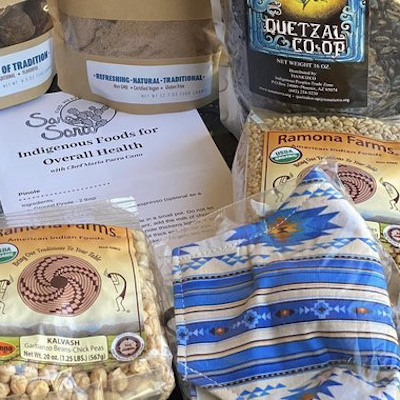
How does the Phoenix community development garden grow? With innovations like the Funds to Feed grant administered by LISC Phoenix. Here’s how a city of Phoenix CARES Act story begins:
COVID-19’s devastating socioeconomic impact on underserved communities already struggling in food deserts required a crisis response with as many helping hands as possible doing the hard work of ensuring individuals and families avoid hunger.
Or maybe what it took was the community development version of a green thumb, a grower’s heart and a commitment to plow new ground in grant-making.
(Photo by Cihuapactli Collective)
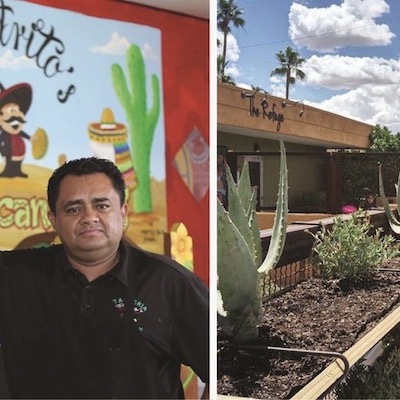
The unprecedented economic impact of COVID-19 took a huge toll on small businesses. LISC Phoenix is in the thick of helping those businesses, especially those owned by women and people of color, get through the crisis.
Here are some of the stories that capture some of LISC’s equitable economic development work:
“2 Beloved Small Restaurants receive Verizon LISC Small Business Recovery Fund Grants”
“Banking on community trust and relationships to secure equitable access to PPP”

JDD Specialties is a consultant and writer for Virginia G. Piper Charitable Trust, one of the nation’s top-100 foundations. The trust awards annually about $23 million in grants to nonprofits in Maricopa County.
During the COVID-19 pandemic, JDD Specialties helped the trust communicate a multifaceted, rapid response of strategic emergency grants.
In August 2015, JDD Specialties helped the trust and the Arizona Commission on the Arts with a joint announcement about a three-year grant to launch the AZ Creative Aging initiative, which a national leader of the creative aging movement called “brilliant.”
JDD Specialties wrote the extended profile on Russ Perlich, the 2015 Piper Trust Encore Career Prize awardee and the brief profiles of 2016 Encore Prizes for Exceptional Organizations.
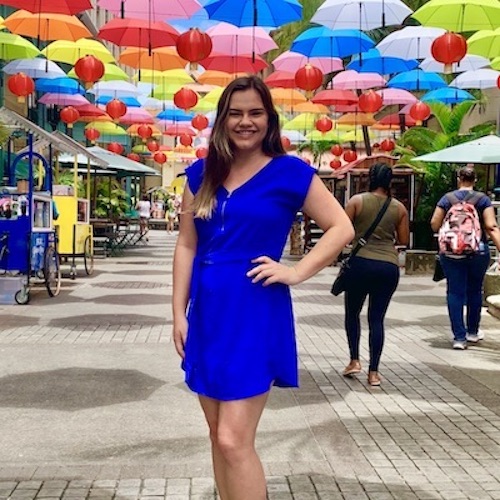
Bianca Buliga grew up thinking ‘business’ was a dirty word and that nothing good comes of its practice. Her early perceptions seemed diametrically opposed to her life goal of making positive, societal change. The 2017 graduate of the ASU Thunderbird School of Global Management knows better now. In April 2020, She was featured in the school’s Alumni Spotlight.
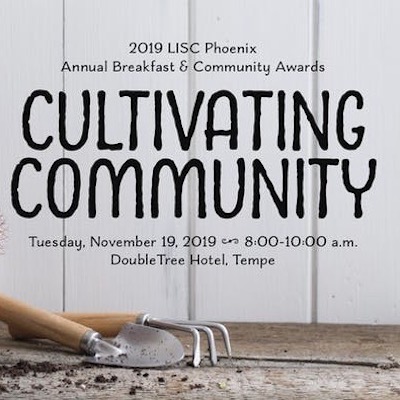

This wrap-up of a LISC Phoenix event that has become a major celebration of community development work in Arizona featured LISC COO Annie Donovan. The national expert in community development and impact investing, shared five things to focus on when addressing structural factors that create and perpetuate poverty in our communities.

The Red Book magazine wanted a profile on an artistic newcomer who has quickly made a name for herself in the Valley. She brought a lot with her in her move from Louisiana to Arizona.
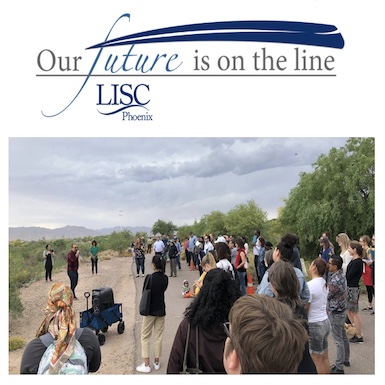
Editor’s note: This article was written for LISC Phoenix and is posted on its website.
On a recent spring day in south Phoenix, nature served up a chilly wind and some sprinkles of rain as a reminder of its power to affect how people feel. A few dozen desert dwellers who had gathered at the Rio Salado Recreation Area for a conversation about the socioeconomic importance of place shivered and tried to brace themselves.
It was an appropriate metaphor for a day of reflection about the powerful, unnatural force of displacement. It’s chilling. Community development institutions and organizers, in Phoenix and throughout the United States, are hunkering down in their fight against it.
Displacement is the forced movement of people from places where they have deep connection to the land and typically where there is cultural relevance. When it moves low-income households out of their neighborhoods to make way for housing that only higher-income renters and buyers can afford, displacement ushers in gentrification.
David Greenberg, national director of research for LISC, sees the need for well-organized counter movements to displacement, particularly in the area of affordable housing.
“Through organizing, it’s often possible to expand upon what we think might otherwise be possible to support the affordable housing movement more broadly and bring together people to policy to shape place,” Greenberg said.
Continue reading
LISC Phoenix and its community development partners sponsored a forum on anti-displacement strategies. I wrote the article that wrapped up the half-day session on April 16 and a tour later that at the Rio Salado Recreation Area in South Phoenix.

Editor’s note: Miracle Mile on McDowell is the latest entry in the LISC Phoenix “Communities on the Line” series. Nearly seven decades ago, shop owners frustrated by the challenges of conducting business in downtown Phoenix went looking for the next big thing in local commerce. They found it on McDowell Road, which back then was on the outskirts of town. McDowell Road quickly became a mid-century commercially vibrant, pedestrian-friendly place to be. A stretch of east McDowell was so thick with business activity it became known as the “Miracle Mile.” Fortunes changed just as quickly for Miracle Mile. By the late 1950s, the hot spot was snuffed out by the next big thing — Park Central, Arizona’s first shopping mall. 
Decades of neglect and abandonment and policy decisions turned McDowell Road into a major route for commuters rather than a destination location or a place with goods and services for neighbors. McDowell Road is getting a second chance. In contemporary terms that signal next-big-thing status — revitalization, diversity, inclusion, small-business investment, creative placemaking, connected neighborhoods — the east McDowell Road commercial corridor from 7th Street to Highway 51 is heating up again. The area has amassed an array of ethnic restaurants and markets (Salvadoran, Ethiopian, Morrocan, Mexican) and is becoming a hub for immigrant and refugee entrepreneurship. Other small business also are finding success in the corridor.
Note: This blog is an installment of the LISC Phoenix monthly series, “Communities on the Line.”
The area near the Park-n-Ride lot at 19th Avenue and Camelback Road is one of the most ethnically rich, culturally diverse parts of Phoenix. It has been for decades, largely because of a large concentration of immigrants, including refugees who are part of resettlement programs.
It is one thing to find shelter. It is another thing for refugees and immigrants far removed from the life and culture they knew to earn a living that affords the coveted American dream.
But that, too, is happening in neighborhoods near the Park-n-Ride at the Valley Metro light-rail stop at 19th Avenue and Camelback Road. Organizations like the International Rescue Committee and Local First Arizona support a growing microenterprise business community among Phoenix immigrants and refugees. Many of the small businesses in the area — restaurants, a deli, barber shops, a clothing store — are owned by refugees who became U.S. citizens.
See for yourself what’s happening in the neighborhood. On May 6, the third World Bazaar and Phoenix Community Market at the Park-n-Ride lot will offer food, crafts and entertainment that reflect the cultures hidden in plain view in Phoenix. The free, family-friendly event is from 10 a.m. to 2 p.m.
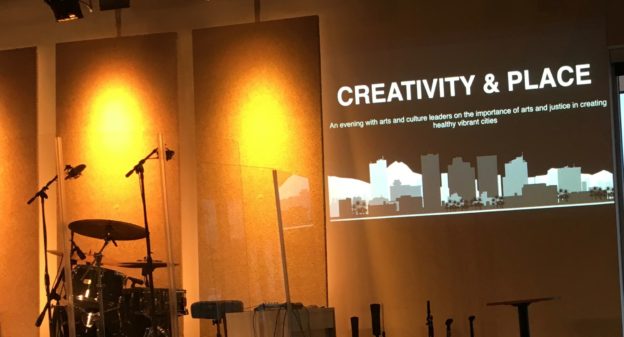
(Note: This blog is part of ongoing work on behalf of LISC Phoenix to underscore the importance of comprehensive community development strategies.)
South Phoenix is “ground zero” for a comprehensive community development strategy that makes art and social justice important parts of neighborhood revitalization. What that means in theory and practice depends on how the table is set and who is seated there, according to a panel of community organizers and urban planning experts.
The panelists at the LISC Phoenix-sponsored event generally agreed that reaping broad-based benefits from arts and justice initiatives requires a commitment to collaboration and a willingness among community development professionals and neighbors to do things differently.

It’s a good day when references to Sisyphus, Machiavelli and John Adams pop up in perfect moments during a short interview. What a departure from the unavoidable social media poison accepted as civic engagement and productive discourse.
Thoughtfulness and community spirit can sprout and grow in the harshest political and social landscapes. Phoenix, in many respects, is such a place. But here’s a riff that warms my heart. It’s by a Valley business leader, who would be considered a conservative in another time and place, discussing one challenge of making Phoenix the healthy, inclusive, resilient place it should be:
“I’m very passionate about a legacy for this community, for my children and my grandchildren to have a cultural economy that feeds the soul of the community but also attracts and retains the kinds of businesses that we need for economic development. It’s critical to our success. And while people will say that with platitude and with words, there is not a lot of action. I’m one of the lone rangers out there just beating the drum. I think I’m like John Adams: I’m obnoxious and disliked about this, but, nonetheless, it’s important. In my world, no is just the beginning of the conversation.”
Word. Right on. Amen.
Getting to “yes” on healthy societal changes requires a long view, steadfastness and commitment.
Persistence.
The resistance language spoken so loudly today in the public square means nothing without persistence. Resistance movements are often spirited are difficult to sustain.
Persistence infused with insistence endures. The most effective change agents have led righteous persistence movements.
Establishing an American society where human values are self-evident is a work in progress. It always has been. The best work on universal goals always has been at the local level — by city block, neighborhood and zip code and by school, city council and legislative districts. An insistence on doing the right thing changes the world around you.
That principled work is harder in some moments than in others. “No” can sound emphatic, and it’s dispiriting. We’re in one of those moments. Persistence pushes us forward on the path to “Yes!”
It’s Friday the 13th and I’m thinking about my incredibly lucky start to what will be one of the most challenging years of our lives. Worries about my nation are allayed by dozens of people who were part of my world during the first weeks of 2017.
A mix of serendipity and intentionality put me in contact with people who understand that strengthening the place where we live helps build a more perfect union. Some of them are adding to their proud legacies. Others are hard workers who are committed to finishing important work they’ve started. Some are just getting started.
Yes we can. Yes we did. Yes we will. Sí, se puede. Indeed.
 The New Year begins with calls to address the fallout of what can fairly be described as the great political earthquake of 2016. Yes, let’s do act with newfound determination to make things better, but let’s also make an investment of time and effort to think before we act.
The New Year begins with calls to address the fallout of what can fairly be described as the great political earthquake of 2016. Yes, let’s do act with newfound determination to make things better, but let’s also make an investment of time and effort to think before we act.
Next week, there are two fantastic opportunities to immerse in thoughtfulness that informs efforts to create the kind of healthy, productive society we want in the Valley. On Tuesday, the Virginia G. Piper Charitable Trust will host an installment of its Thought Leaders Series with a focus on “Advancing Resilience in Arts and Culture: The Value of Cross-Sector Partnerships.” The forum at the Beus Center for Law and Society in downtown Phoenix is open to the public.
As a Piper Trust thought leader, Chris Ronayne, president of University Circle in Cleveland, an innovative square mile of urban development that features universities, hospitals, museums, parks, restaurants and residential spaces, will share lessons learned about creating a resilient community that has become a destination point for living, working and playing.
 On Thursday at South Mountain Community College, the Arizona Community Foundation, the Center for the Future of Arizona and the Girl Scouts–Arizona Cactus-Pine Council will host a conversation with Robert Putnam, author of the fantastic book Our Kids: The American Dream in Crisis, which dug deeply into the perils of the growing opportunity gap among young people in the United States. The book published in 2015 speaks to the dangers of unequal opportunity, and it proved to be a fascinating precursor to some of what transpired in the national election.
On Thursday at South Mountain Community College, the Arizona Community Foundation, the Center for the Future of Arizona and the Girl Scouts–Arizona Cactus-Pine Council will host a conversation with Robert Putnam, author of the fantastic book Our Kids: The American Dream in Crisis, which dug deeply into the perils of the growing opportunity gap among young people in the United States. The book published in 2015 speaks to the dangers of unequal opportunity, and it proved to be a fascinating precursor to some of what transpired in the national election.
While we ramp up resolve in 2017 to fix what clearly is broken and to protect programs and values we fear are under assault, let’s embrace fundamental change in our approaches to building up society. Let’s listen and learn before we act.
 I’ve been floating in the center space that William A. Galston and William Kristol write about for a long time. Those who occupy center left and center right are often accused by those on the far left and far right as being fence-sitters, of having no core values. That’s offensively dismissive.
I’ve been floating in the center space that William A. Galston and William Kristol write about for a long time. Those who occupy center left and center right are often accused by those on the far left and far right as being fence-sitters, of having no core values. That’s offensively dismissive.
Those in the center can fairly be accused of sitting on the sidelines while the partisan left and the right duke it out. That’s been a mistake and we see the lack of good governance that results.
I love this in the duo’s Viewpoints column:
“The basic institutions and principles of liberal democracy are under assault. Many of us who are defenders of this distinctive form of self-government have tended to take for granted widespread agreement on these principles; we have had confidence in the strength of these institutions. This is a complacency we can no longer afford. …
Opportunity, security, accountability, ingenuity — these are the pillars of a New Center. We do not know what policies a New Center will yield. Nor can we predict what institutional form or even party alignment it will take.
But the alternative to a coherent and effective New Center is a degree of public discontent that could end by undermining democratic self-government itself. ”
 I like to think the late Monsignor Ed Ryle would have been an intellectual voice of reason, compassion and greater good in this awful excuse for a presidential campaign. I would have loved to have heard his take on the minimum wage proposition on the Arizona ballot and the campaign for Maricopa County sheriff.
I like to think the late Monsignor Ed Ryle would have been an intellectual voice of reason, compassion and greater good in this awful excuse for a presidential campaign. I would have loved to have heard his take on the minimum wage proposition on the Arizona ballot and the campaign for Maricopa County sheriff.
I flatter myself by thinking he would have invited me to lunch (or to “break bread,” as someone reminded me he was fond of saying) to share thoughts about politics and policy. On election night, he might have been spotted sipping a glass of wine with other political junkies.
He is so missed.
A few of his friends and those who have had long respected Monsignor Ryle’s work for social justice in Arizona have been trying to keep his memory alive. The Monsignor Edward J. Ryle Fund was established to promote intelligent discourse in the public square. We think he’d be proud of the work done in his name.
I like to think he’d get a kick out of the way we help pay for annual programs. We sell a lovely Sonoma County pinot noir labeled in his honor, called The Monsignor.
We’re taking orders for full and half cases now. It will be available for pickup on Dec. 6. Contact me for details.

The Be Kind People Project, a Phoenix-based nonprofit organization, launched its national Be Kind America campaign in October 2016. JDD Specialties provided communication support and helped implement the initiative.
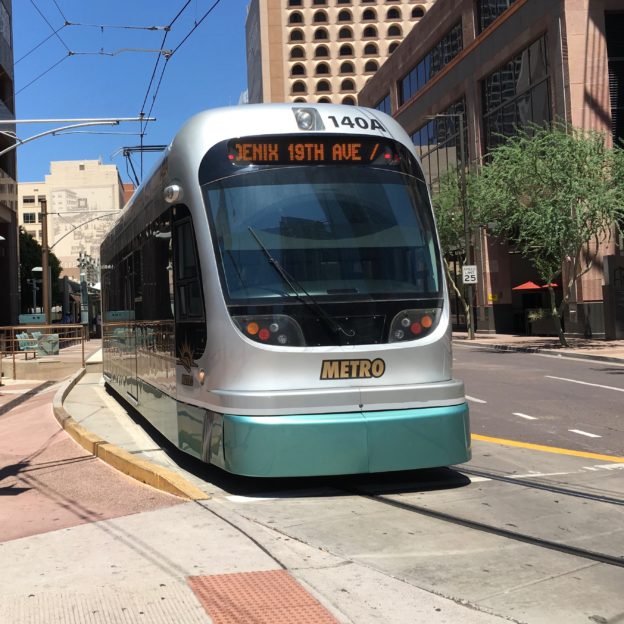
 Valley Metro Rail’s South Central Extension is like no other for its potential to create healthy, vibrant communities in a corridor long suffering from neglect and disinvestment. It’s heartening three years before construction to see concerted effort to not blow it.
Valley Metro Rail’s South Central Extension is like no other for its potential to create healthy, vibrant communities in a corridor long suffering from neglect and disinvestment. It’s heartening three years before construction to see concerted effort to not blow it.
The 5.5-mile extension will connect a south Phoenix population that’s highly dependent on public transportation to the larger region. And as the original light-rail route and subsequent extensions have shown, the $700 million South Central Extension will spark incredible transit-oriented development projects.
Albert Santana, light-rail administrator for the city of Phoenix, said other extensions of the light-rail systems were like rubber bands. They stretched the original route to the east and to the northwest. The Southwest Extension is like a spoke. It is connecting the light-rail system to an entirely new part of town, he said.
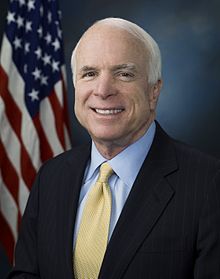
How John McCain can condemn Donald Trump for outrageous statements, such as those leveled at the Gold Star Khan family, but still endorse the Republican nominee for president is a fair question that’s easy to answer. It’s because he’s walked in Trump’s shoes and lived triumphantly as a politician to benefit from it.
Arizona’s senior senator and the 2008 Republican nominee for president knows a thing or two about saying stupid, incredibly cruel things, often about people who deserve better. McCain also knows it doesn’t take much for voters, especially political party faithful, to forgive, forget and elect. McCain has benefitted from Arizona voter magnanimity for 34 years as a U.S. representative and senator.
“Cynicism is a refuge for cowards.”
— Sen. Cory Booker, D-NJ, at the Democratic National Convention in Philadelphia
 Cynicism as a scourge of civic engagement is a familiar theme of Cory Booker’s speeches. The highly quoted riff in his speech Monday at the Democratic convention is particularly on point in this long, bitter, depressing political season.
Cynicism as a scourge of civic engagement is a familiar theme of Cory Booker’s speeches. The highly quoted riff in his speech Monday at the Democratic convention is particularly on point in this long, bitter, depressing political season.
“Cynicism is a refuge for cowards.” Booker is right. But Tom Wolfe’s words in The Bonfire of the Vanities also speak directly to 2016 American democracy when he described cynicism as “a cowardly form of superiority.”
My list of things I wish I had said grew a lot this week — a week that from start to finish was full of highlights of a world seemingly gone mad. Relief from despair comes from hearing and reading words that struck a chord.
George W. Bush, David Brooks, Charles Cooke and Bryan Stevenson were on point with these gems that make sense and give hope.
I think Mom’s cardiologist nearly had heart attack during her checkup.
Mom and Doc always chitchat during visits, usually about his growing up in Detroit in the ’60s and their shared appreciation of Sam Cooke.
But then Donald Trump’s name came up and I chimed in. I challenged his assertion that “there’s no way, NO WAY” Trump wins the election. When I mentioned “Brexit” and the populist similarities in U.S. politics, the usually laid-back jazz-lover got flushed and started scooting his little wheeled doctor’s stool in a back-and-forth motion.
“It’s not going to happen. Never. NEVER,” Doc said. “I’ll get you any bottle of wine you want if he wins.”
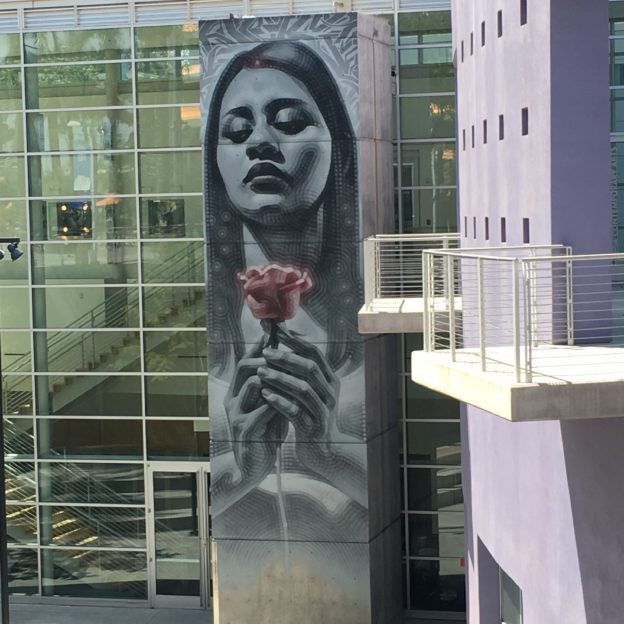
There’s more to arts and culture in community redevelopment than meets the eye. Arts and culture can be an anchor in economic development strategies and a significant component of urban revitalization.
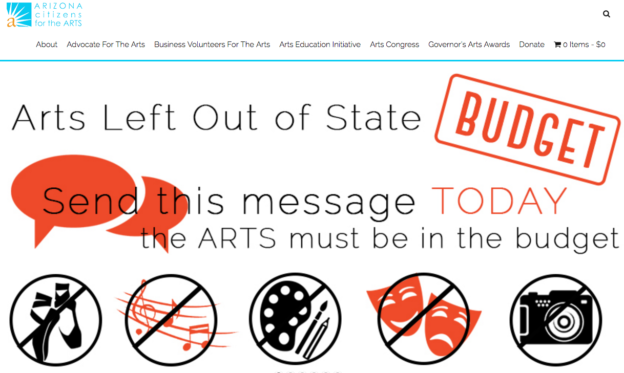
“If you’re not willing to stand up for what you care about, others will control the agenda.”
– Rusty Foley, executive director, Arizona Citizens for the Arts, in a Phoenix New Times article about the absence of arts funding in the state budget
Amen, sister.
But Rusty’s call for civic engagement applies to so much more than arts funding.
 This blog post about Proposition 123 on the May 17 ballot validates my choice of Arizona Teacher of the Year Christine Marsh as an inspiring Arizonan to watch in 2016.
This blog post about Proposition 123 on the May 17 ballot validates my choice of Arizona Teacher of the Year Christine Marsh as an inspiring Arizonan to watch in 2016.
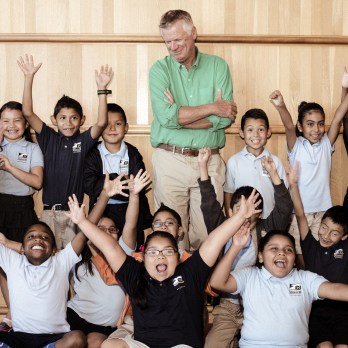
JDD Specialities was honored to write the profile of Russ Perlich, the 2015 Piper Trust Career Prize awardee. Perlich, a graduate of the University of Arizona and a retired CEO of Phoenix-based Quadna, is the co-founder of Act One. He received the $50,000 Virginia G. Piper Charitable Trust prize for his post-career work in ensuring students from underserved public schools experience the arts.
JDD Specialties also wrote the news release announcing the prize awardee.
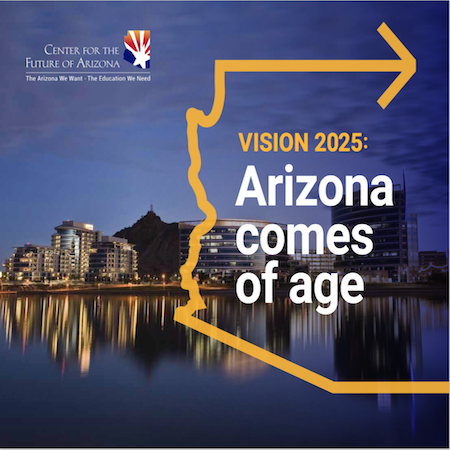
JDD Specialties founder Jennifer Dokes was a critical reader for the Center for the Future of Arizona’s October 2015 report, “Vision 2025: Arizona Comes of Age.”
Credit? State Capitol leaders want credit for what they do to public education? Please.
Fixing a budget policy mistake that jeopardized the highly successful and intensely popular career and technical-education programs is the right thing to do. But the action deserves no high fives or back slaps, and it certainly shouldn’t qualify for election-year campaign bragging rights.
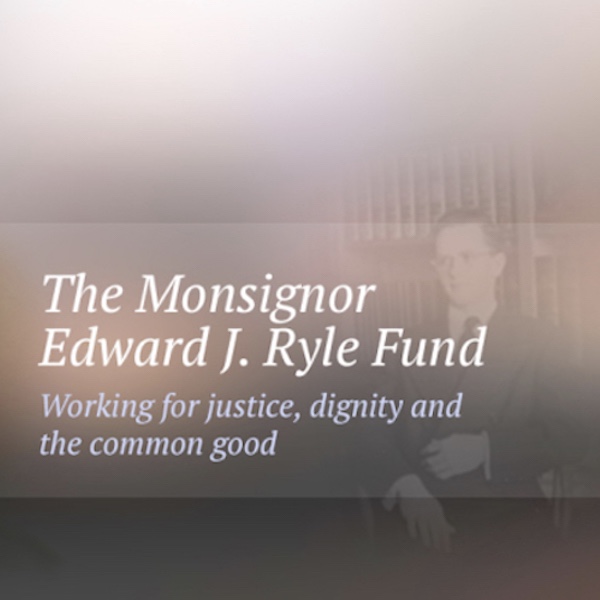
Jennifer Dokes joined the board of the Monsignor Edward J. Ryle Fund in January 2016. The fund, established in memory of a legendary Arizona scholar and advocate for social justice, promotes intelligent discourse in the public square.
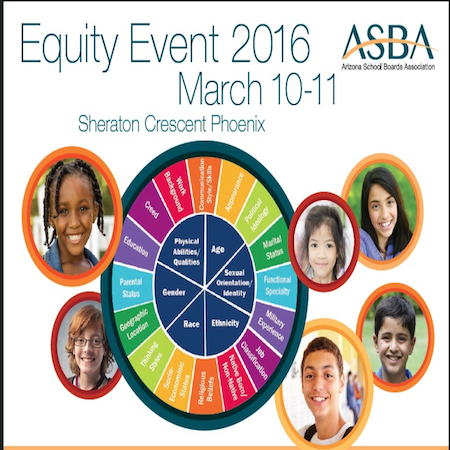
JDD Specialties facilitates discussions of key issues of the day. For example, founder Jennifer Dokes was the moderator for an Arizona School Boards Association discussion with thought leaders about the nexus between education equity and Arizona’s future.
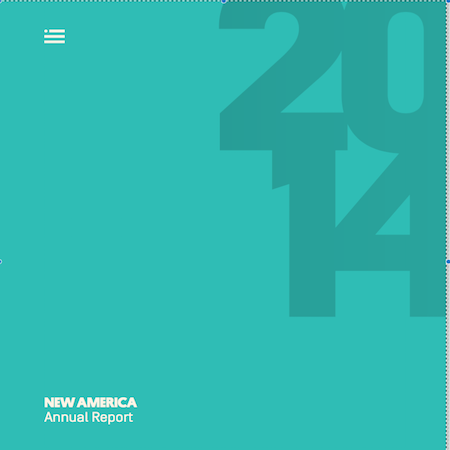
Coleman Strategies LLC, based in Washington, D.C., hired JDD Specialties as an editorial services subcontractor for the first annual report of New America, a nonprofit civic enterprise.
The Arizona Republic editorial board recently published its showcase of interesting or influential people to watch in the new year. It’s a fun exercise and an annual conversation/argument starter.
I understand the selections for the 16 Arizonans to watch in 2016. They make sense from an editorial board perspective. But as an Arizonan looking for clear-eyed, innovative leaders, I felt uninspired and a bit despondent after reading the list.
I searched for something better from my perspective, not the editorial board’s perspective, and came up with a list of people I believe will make 2016 interesting for a lot of right reasons. Here are the Arizonans I’m watching in 2016:
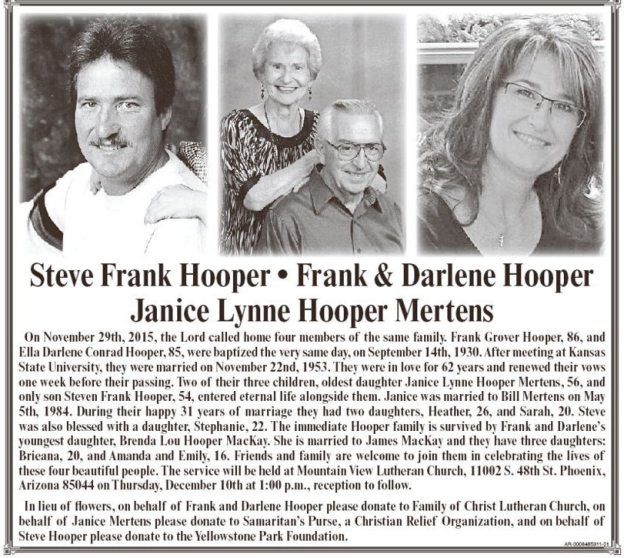
The three-panel photo in the Sunday obits caught my eye, but it was the name associated with it that touched my heart: Frank Hooper. Although we never met, I knew him as Frank Hooper, Sun Lakes.
For many years as a member of The Arizona Republic editorial board, I read and selected letters to the editor for publication. At one point, that was about 500 letters a week. I loved it for the insight into the minds of people who are intellectually or emotionally engaged in the news of the day.
Frank Hooper was a regular letter writer. I felt like I knew him well. His contributions to public discourse were thoughtful, respectful and concise. He obviously was comfortable with the written word and was confident enough to sign his name to his opinion and tell you where he lived. An anonymous Internet troll, he was not.
Frank had something to say about a lot of things, and although I often didn’t agree with him, I certainly appreciated his ability and desire to share his point of view in the marketplace of ideas that is the Opinions page. I found some of his letters on azcentral about Obamacare, Ferguson, inflation. One of his most recent ones published in June was about water conservation.
Frank, his wife and two of his children died in a horrible, head-on collision shortly after Thanksgiving. Speed and alcohol were likely factors. The other driver, who also died in the crash, had two DUI convictions.
If this had happened to another family and if Frank had seen the obit, I’m certain he would have had something to say. And it would have been worth printing.
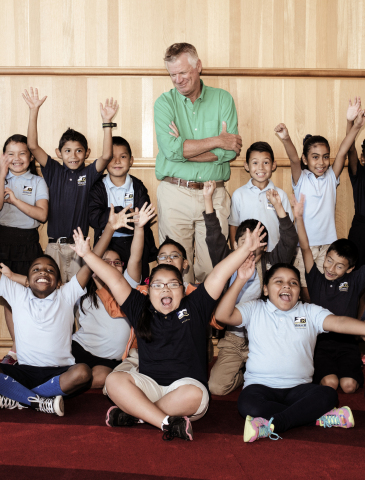
Retired CEO Russ Perlich deserves more attention in the business community for receiving the Piper Trust Encore Career Prize. The arts and education communities should be focusing a spotlight on him, too. There are probably a million reasons his story should resonate in the Valley.
Unfortunately, Arizona, for all its gifts, assets and opportunities, is stuck in a dreary place of inertia and woe. We talk a lot the lack of business and political leadership with no interest in long-term vision and no patience for long-term goals. We lament there being so few Arizonans in places high and low doing the right things to address foundational cracks in the state. It’s difficult these days for bright lights like Perlich to pierce the darkness.

Shaun McKinnon of The Arizona Republic wrote a beautiful story about how the $2 million Isle of the Tiger project at the Phoenix Zoo came to be. I heard another beautiful zoo story on Thursday, the night of the grand opening celebration of the exhibit.
Here’s a passage from Lisa Shover’s speech to about 450 people. (Lisa represented the Nina Mason Pulliam Charitable Trust, a major donor:
 I’m expecting to be hit with a heavy dose of nostalgia tonight at former Arizona Republic editorial board colleague Kathleen Ingley’s book event at the central Phoenix public library.
I’m expecting to be hit with a heavy dose of nostalgia tonight at former Arizona Republic editorial board colleague Kathleen Ingley’s book event at the central Phoenix public library.
Kathleen’s telling of the Jack Pfister story is a lesson plan for civic, business and political leaders on how to focus on what’s important in Arizona and how to accomplish visionary goals. Remember those days? I do. Generally speaking, leaders in power today are far removed from the spirit and purpose of the Jack Pfister  days. And we have a messes everywhere that show it.
days. And we have a messes everywhere that show it.
Former legendary lawmaker Art Hamilton, and former ASU president Lattie Coor, two fine gentlemen who led by example, will be among the panelists with Kathleen discussing the life and influence of Jack Pfister. (Kathleen teed up the book and the event with this Viewpoints column.
 Art and Lattie talking about Jack at the library named for Burton Barr, another legendary leader. Yeah. My date with nostalgia is at 6:30.
Art and Lattie talking about Jack at the library named for Burton Barr, another legendary leader. Yeah. My date with nostalgia is at 6:30.
Tommy Espinoza makes the most of things, whether it’s investing capital or seizing moments. The Valley is better for it.
The Arizona native packed a lot into the five minutes he had Friday to wrap up the big announcement that Raza Development Fund and LISC Phoenix boosted their equal partnership in the Sustainable Communities Transit-Oriented Development Fund by $30 million. In 2011, the partnership put an initial $20 million into the transit-oriented development fund.
U.S. Transportation Secretary Anthony Foxx, Phoenix Mayor Greg Stanton and other dignitaries were on hand to hear Espinoza, president and CEO of Raza Development Fund, speak from the heart about Phoenix, the Latino community and low-income families. He was on point when he said, “Community development is about building up families, not building up buildings.” His riff on social, business and political leadership included a play on the highly charged words “anchor babies.” (Yep, he went there.)
 I’m sure fine speeches were delivered Saturday at the opening of the light-rail extension in to downtown Mesa. But the candid, cute comments Mesa Mayor John Giles gave Friday at the announcement that LISC Phoenix and Raza Development Fund will add $30 million dollars to a transit-oriented development fund for projects along the Valley Metro light-rail route are worth sharing for their insights about downtown Mesa’s history and the success of light rail.
I’m sure fine speeches were delivered Saturday at the opening of the light-rail extension in to downtown Mesa. But the candid, cute comments Mesa Mayor John Giles gave Friday at the announcement that LISC Phoenix and Raza Development Fund will add $30 million dollars to a transit-oriented development fund for projects along the Valley Metro light-rail route are worth sharing for their insights about downtown Mesa’s history and the success of light rail.
U.S. Transportation Secretary Anthony Foxx and Phoenix Mayor Greg Stanton also delivered remarks at the announcement, which kicked off a flurry of transit-related activities in the Valley over a few days. The three-mile extension of light-rail through downtown Mesa opened Saturday. On Tuesday, Phoenix voters will decide the fate of the Proposition 104 transit tax, which in part, expands the light-rail system.
Here are excerpts from Giles’ comments:
“I’m very excited to be in Arizona because it’s where strong women can get things done.”
I like this partial quote from The Arizona Republic’s Q&A with Sheila Healy, the new executive director of the Arizona Democratic Party. It’s true. Women always have had a strong showing in Arizona politics.
Should Phoenix exist? What a dangerous question. I love it.
Zócalo Public Square and the ASU College of Public Service and Community Solutions launch a community conversation with the “Should Phoenix Exist?” prompt. The event June 2 at the Heard Museum features former Phoenix Mayor Terry Goddard and New York University professor Andrew Needham, author of “Power Lines: Phoenix and the Making of the Modern Southwest” and Sarah Porter, director of the Kyl Center for Water Policy at the ASU Morrison Institute.
“Make it snappy” takes on new meaning when writing “Quick Hits,” brief comments by Arizona Republic editorial board members featured at the top of the Opinions page. You must reach a point quickly and it has to pop.
Here is a sample of what I said in 2014.